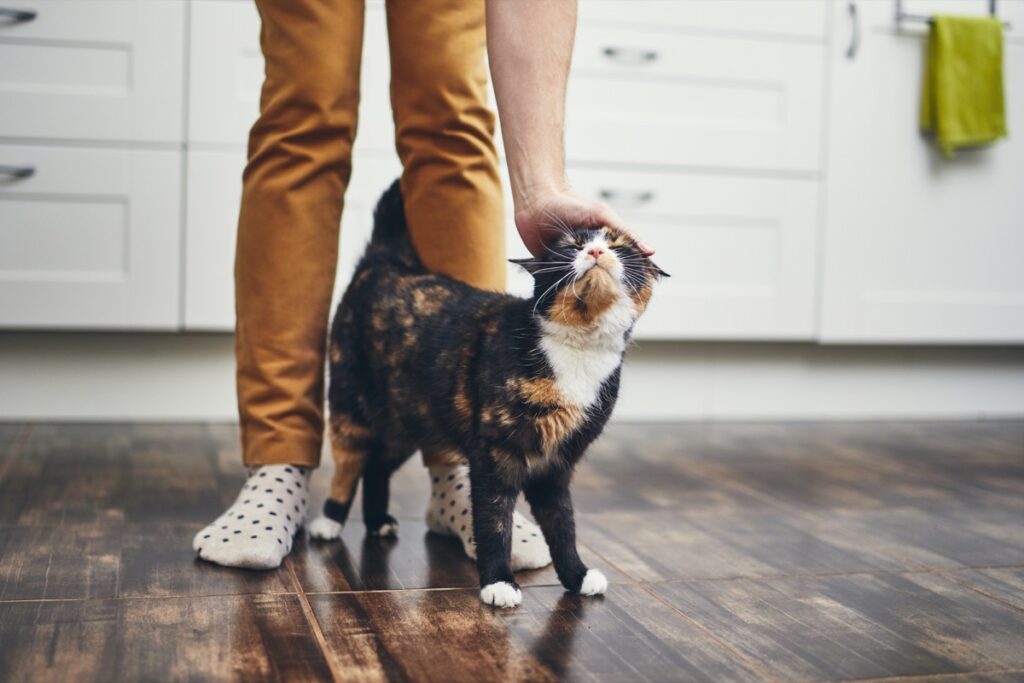Your kitty is a valued member of the family. She deserves your loyalty, devotion, and protection.
Sometimes you have to compromise your comfort and luxury to keep her safe.
That comes with the job description of being a pet parent. For instance, if you love houseplants and want a forest in your space, you have to give up the ones that may hurt your pet.
Essential oils fall in the same category. Despite having tremendous benefits for humans and pets, some are hazardous for cats. They are highly concentrated and can be overwhelming to the feline system.
For one, essential oils have intense fragrances that your cat will find to be overpowering.
Most importantly, cats don’t have enzymes to digest some of the compounds found in these oils.
Today, we look at the lemon thyme essential oil. From treating anxiety to boosting vitamin C and healing colds, this popular oil is beloved in aromatherapy.
It also makes a great cleaning product. But can cats tolerate it?
We investigate…
Lemon Thyme at a Glance
Lemon and thyme are common spices in the kitchen. We use them to flavor food, make salads, marinate meats, prepare cakes, and make juices.
Lemon is also used to clean dishes and floors, and to preserve food.
The thyme herb and lemon peels contain the essential oils that we love. They can be extracted and combined to make what we know as lemon thyme essential oil.
With two powerful ingredients, the oil is used to perform a plethora of functions.
Healthline claims that thyme essential oil may reduce acne, treat alopecia, fight breast cancer, heal coughs, eliminate food-related fungi and bacteria, fight heart disease, and reduce oral infections and inflammations.
Lemon essential oil, on the other hand, can be used to reduce depression and anxiety, ease morning sickness, kill skin bacteria, offer relief from pain, soothe a sore throat, help with breathing, promote wound healing, and boost mental alertness.
Usage Around Cats

Lemons and cats are like oil and water. They don’t mix very well.
If you want to prove this, cut up a lemon and bring it near your kitty’s mouth. Once she catches a whiff of the citrus fruit, she will pull back and dash off to another location for a breath of fresh air.
Lemons contain toxic compounds such as limonene, linalool, and psoralens – all of which are hazardous to cats. Lemon essential oil has the same compounds.
As Pet Poison Helpline states, anything with d-limonene is toxic to our furballs.
When your cat ingests it or takes it in through inhalation, it remains undigested and can cause respiratory distress and organ failure.
The ASPCA hasn’t listed thyme in its toxic or non-toxic list. However, when you look at its chemical composition, it does contain about 47% thymol which is essentially a phenol.
Our little furry friends react badly to phenols and phenolic compounds according to the article above by Pet Poison Helpline. They lack the right enzyme to metabolize it. If it lingers in the body too long, it will damage the liver and kidneys.
If this article by Rahab Vet is anything to go by, Thyme linalool is a safer version. Cats can handle it.
What can harm them are Thyme White and Thyme Red. These have toxic compounds and may be hazardous to your pets.
Thyme essential oil is clearly unsafe for your sweet furball. Even if you utilize thyme linalool in the formulation, the lemon oil in it is enough to negatively affect her.
There are no two ways about it – citrus essential oils are simply among the worst oils for your kitty.
You should neither diffuse them around your kitty nor apply them anywhere on their bodies.
Symptoms of Poisoning

According to the ASCPA, essential oils are one of the causes of tremors in cats. If you use lemon thyme in a highly concentrated form, your cat may just have a tremor.
Although the actual tremor has no ill effects for a feline, it signals trouble in its system.
If the toxin stays in your cat’s body long enough, it will eventually shut him off.
Other symptoms of thyme lemon essential oil poisoning include the following:
- Lethargy
- Vomiting
- Pawing at the face
- Respiratory issues (coughing, sneezing, and apparent challenges breathing)
- Gastrointestinal upset
- Central nervous system depression
- Liver damage with yellowing of the eyes, paws, and skin
If your cat is exhibiting any of these symptoms, contact the vet immediately.
Usually, the symptoms begin with the cat pawing at the face and making faces that display physical discomfort.
As soon as the fumes reach her nostrils, she will bolt. Monitor her closely and watch for further symptoms like sneezing, coughing, and vomiting/diarrhea.
Before things escalate and the cat gets seizures or liver damage, she should be at the vet.
While thyme essential oil is bad for your kitty, you can still use it if you exercise caution around it. For instance, rather than diffusing it in your bedroom, you’d rather do it in the bathroom with all the windows closed.
Open all the windows of the house to give the pet a chance to take off when the small becomes too much.
Also, keep the oil out of the reach of your curious friend, and by all means, avoid any contact with the oil on her.
Final Thoughts
Your cat has a heightened sense of smell. While essential oils smell great to you, they are too intense for her.
Additionally, her body doesn’t have what it takes to digest essential oils.
Lemon thyme is downright bad for your kitty. Keep it off your pet or practice a high level of safety when using it.
Which other essential oil isn’t safe around your kitty? Find out from the following posts:

Hi! I am Eleanor Price. I started this website after my cat, Louie, almost died from a case of botulism (a type of food poisoning often caused by bacteria that grow on food items). Turned out that my cat’s diet was the problem. I have made it my duty to provide the best information and recommendations about everything cat lovers need to know about their felines’ health and wellbeing. My goal is to find the most informative content on anything feline-related and share it with fellow hardworking kitty lovers.

